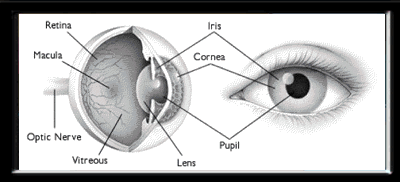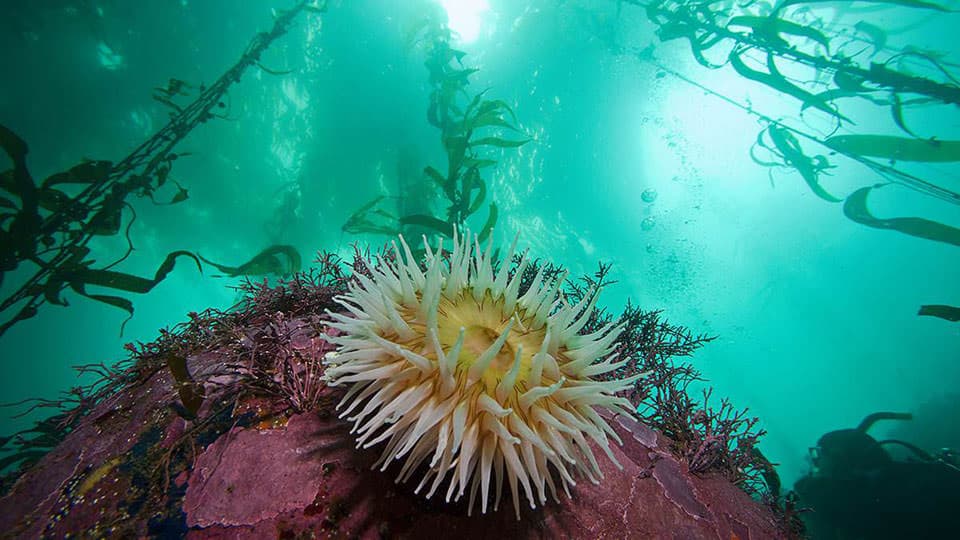How does the freezing and thawing of water cause weathering
How Does The Freezing And Thawing Of Water Cause Weathering. Transforming the rock into igneous rock. Leaving behind sedimentary particles from evaporation b. The two types of rock weathering are physical and chemical. Mechanical weathering is the process of breaking big rocks into little ones.
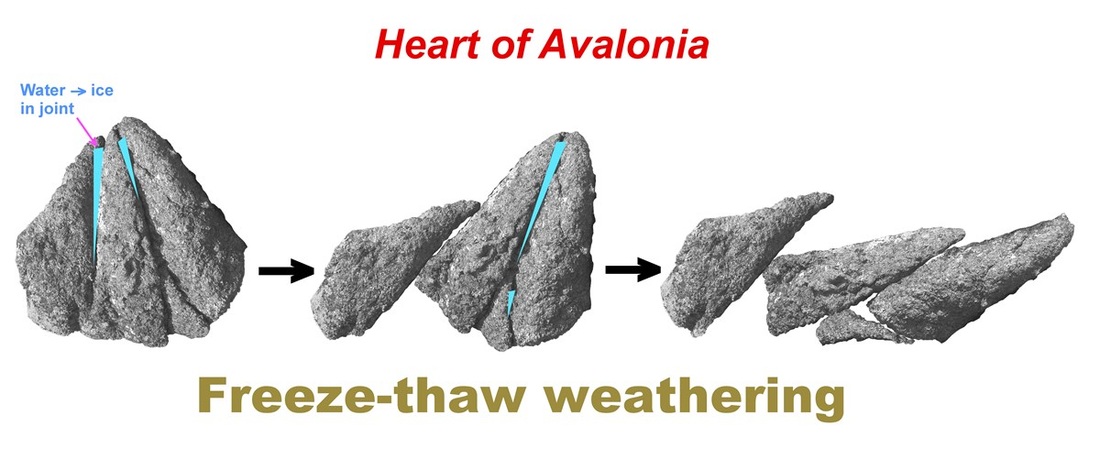 Freeze Thaw From heartofavalonia.org
Freeze Thaw From heartofavalonia.org
There are two main types of physical weathering. If the air temperature drops below zero degrees fahrenheit the water in these cracks will freeze. Subsequently one may also ask how does freezing and thawing of water cause mechanical weathering. Mechanical weathering is the process of breaking big rocks into little ones. Over time this process can work large chunks of stone loose from rock faces and send the debris tumbling downhill into large scree piles. Freeze thaw weathering also known as frost weathering is caused by water working its way deep into cracks in rock faces expanding as it freezes and then driving deeper into the rock when it melts.
Chemically weathering the rock d.
Freezing of water causes it to expands needing more volume to occupy and thus breaking the rocks. From the given choices above the best answer to this item is therefore the second choice. Water increases in volume by about 9 percent when it changes to ice creating enough pressure in tortuous rock fractures to crack most types of rock. There are two main types of physical weathering. Over time this process can work large chunks of stone loose from rock faces and send the debris tumbling downhill into large scree piles. Leaving behind sedimentary particles from evaporation b.
 Source: youtube.com
Source: youtube.com
Freezing of water causes it to expands needing more volume to occupy and thus breaking the rocks. Tourists at mount snowdon in snowdonia wales water eg from rainfall or melting snow and ice becomes trapped in a crack or. The process is sometimes assisted by water. Water increases in volume by about 9 percent when it changes to ice creating enough pressure in tortuous rock fractures to crack most types of rock. That process occurs when the water inside of rocks freezes and expands.
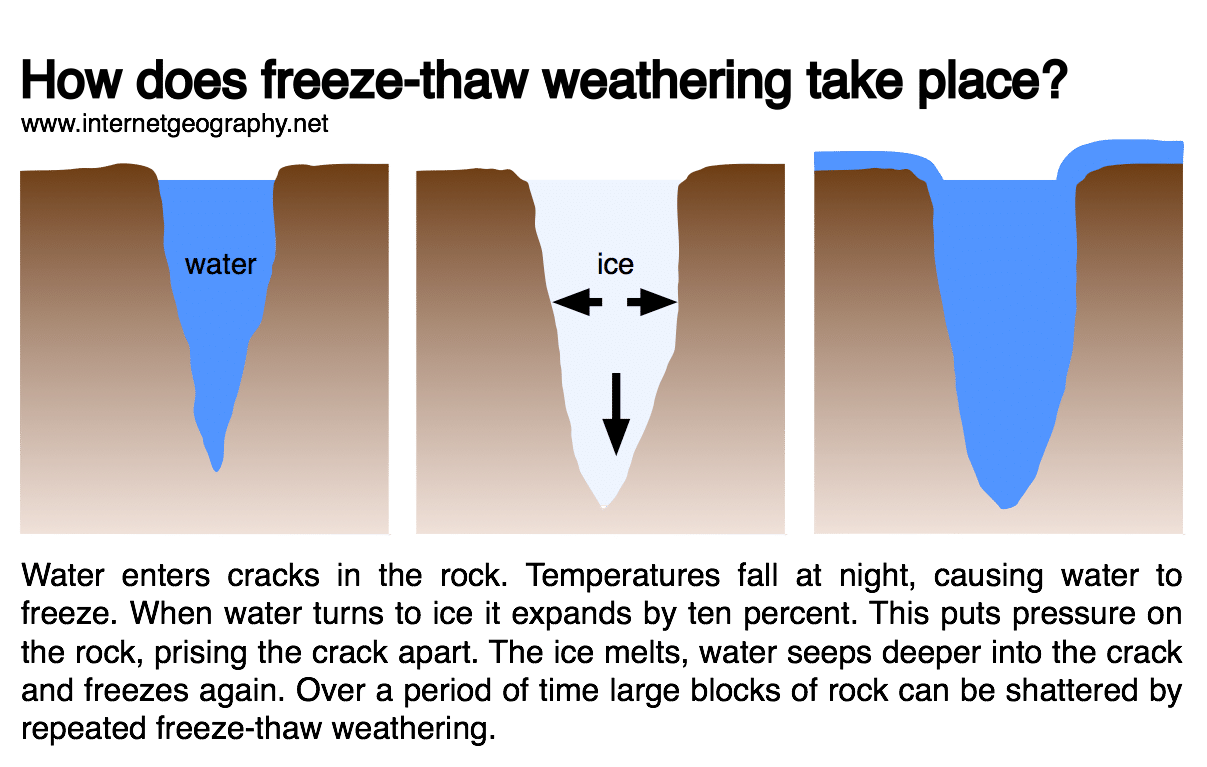 Source: internetgeography.net
Source: internetgeography.net
If the air temperature drops below zero degrees fahrenheit the water in these cracks will freeze. Freeze thaw occurs when water continually seeps into cracks freezes and expands eventually breaking the rock apart. Freeze thaw weathering also known as frost weathering is caused by water working its way deep into cracks in rock faces expanding as it freezes and then driving deeper into the rock when it melts. Subsequently one may also ask how does freezing and thawing of water cause mechanical weathering. Gradually breaking down the rock into smaller pieces c.
 Source: slideplayer.com
Source: slideplayer.com
Freezing of water causes it to expands needing more volume to occupy and thus breaking the rocks. Tourists at mount snowdon in snowdonia wales water eg from rainfall or melting snow and ice becomes trapped in a crack or. Freeze thaw occurs when water continually seeps into cracks freezes and expands eventually breaking the rock apart. The two types of rock weathering are physical and chemical. The process is sometimes assisted by water.
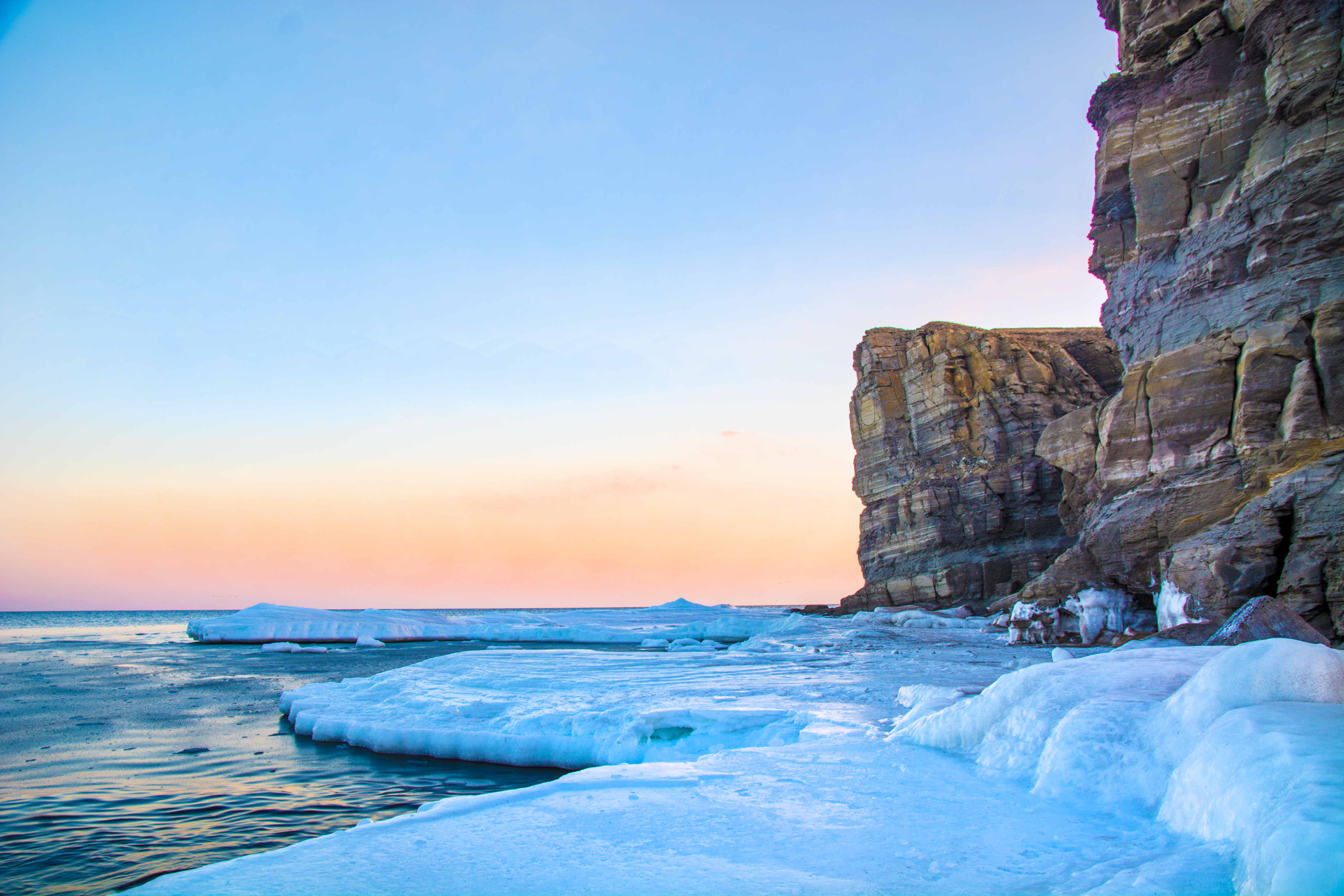
From the given choices above the best answer to this item is therefore the second choice. If the air temperature drops below zero degrees fahrenheit the water in these cracks will freeze. Freeze thaw occurs when water continually seeps into cracks freezes and expands eventually breaking the rock apart. That expansion cracks the rocks from the inside and eventually breaks them apart. The process is sometimes assisted by water.
 Source: pinterest.com
Source: pinterest.com
There are two main types of physical weathering. That process occurs when the water inside of rocks freezes and expands. There are two main types of physical weathering. Disruption of rock fabrics owing to stresses generated by freezing and thawing of water in rock fractures is an important physical weathering process in climates where recurring short term changes from freezing to thawing temperatures take place. From the given choices above the best answer to this item is therefore the second choice.
 Source: slideplayer.com
Source: slideplayer.com
The two types of rock weathering are physical and chemical. If the air temperature drops below zero degrees fahrenheit the water in these cracks will freeze. That expansion cracks the rocks from the inside and eventually breaks them apart. Physical examples are erosion by wind dust or water by freezing and by tectonic activity such as earthquakes. This often occurs during the night.
 Source: m.youtube.com
Source: m.youtube.com
Freezing of water causes it to expands needing more volume to occupy and thus breaking the rocks. Over time this process can work large chunks of stone loose from rock faces and send the debris tumbling downhill into large scree piles. Subsequently one may also ask how does freezing and thawing of water cause mechanical weathering. Physical examples are erosion by wind dust or water by freezing and by tectonic activity such as earthquakes. The freezing and thawing action of water affects a rock by.
 Source: heartofavalonia.org
Source: heartofavalonia.org
Freeze thaw weathering also known as frost weathering is caused by water working its way deep into cracks in rock faces expanding as it freezes and then driving deeper into the rock when it melts. The process is sometimes assisted by water. Over time this process can work large chunks of stone loose from rock faces and send the debris tumbling downhill into large scree piles. If the air temperature drops below zero degrees fahrenheit the water in these cracks will freeze. Mechanical weathering is the process of breaking big rocks into little ones.
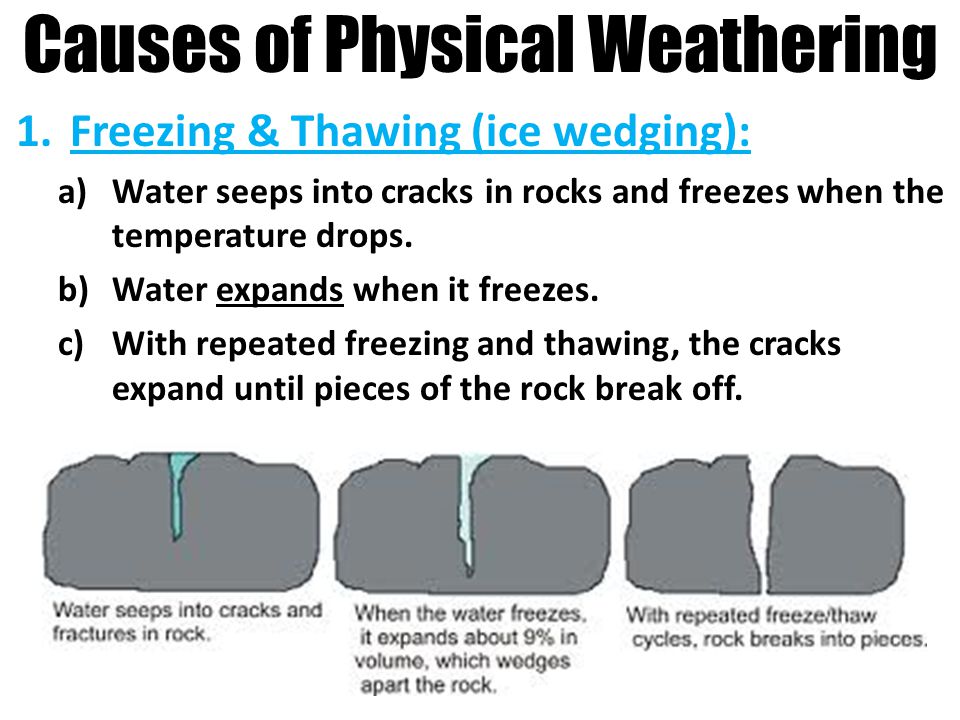 Source: slideplayer.com
Source: slideplayer.com
The process is sometimes assisted by water. Physical weathering is caused by the effects of changing temperature on rocks causing the rock to break apart. Freezing of water causes it to expands needing more volume to occupy and thus breaking the rocks. That process occurs when the water inside of rocks freezes and expands. Chemically weathering the rock d.
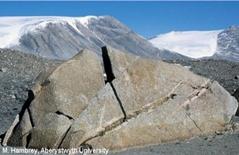 Source: geolsoc.org.uk
Source: geolsoc.org.uk
Freeze thaw occurs when water continually seeps into cracks freezes and expands eventually breaking the rock apart. Subsequently one may also ask how does freezing and thawing of water cause mechanical weathering. Over time this process can work large chunks of stone loose from rock faces and send the debris tumbling downhill into large scree piles. Mechanical weathering is the process of breaking big rocks into little ones. Leaving behind sedimentary particles from evaporation b.
 Source: study.com
Source: study.com
Chemically weathering the rock d. That expansion cracks the rocks from the inside and eventually breaks them apart. Transforming the rock into igneous rock. Disruption of rock fabrics owing to stresses generated by freezing and thawing of water in rock fractures is an important physical weathering process in climates where recurring short term changes from freezing to thawing temperatures take place. Chemically weathering the rock d.
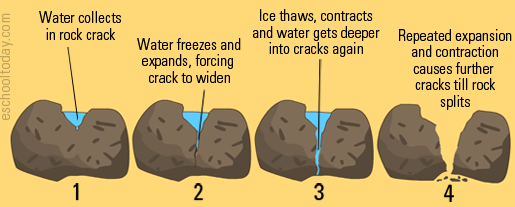 Source: weatheringerosionrivers.weebly.com
Source: weatheringerosionrivers.weebly.com
The two types of rock weathering are physical and chemical. Leaving behind sedimentary particles from evaporation b. Freeze thaw occurs when water continually seeps into cracks freezes and expands eventually breaking the rock apart. The freezing or partial thawing of water trapped in the rocks will cause them to weather because given the proper temperature they will freeze. Chemically weathering the rock d.
 Source: slideplayer.com
Source: slideplayer.com
The two types of rock weathering are physical and chemical. Transforming the rock into igneous rock. Water increases in volume by about 9 percent when it changes to ice creating enough pressure in tortuous rock fractures to crack most types of rock. Over time this process can work large chunks of stone loose from rock faces and send the debris tumbling downhill into large scree piles. From the given choices above the best answer to this item is therefore the second choice.
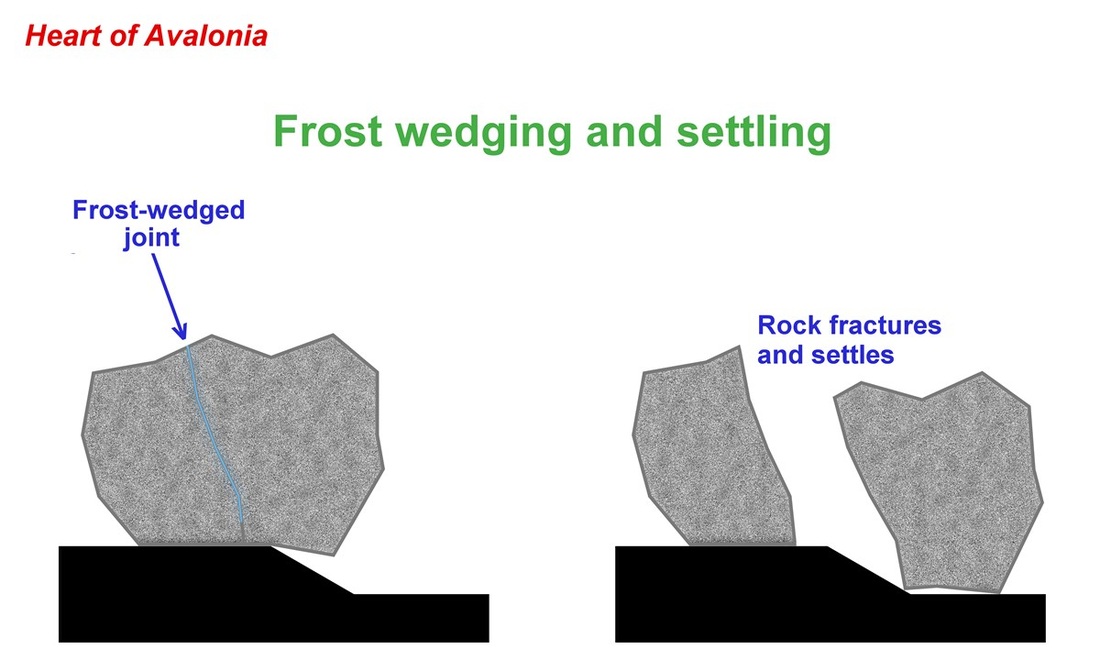 Source: heartofavalonia.org
Source: heartofavalonia.org
Water increases in volume by about 9 percent when it changes to ice creating enough pressure in tortuous rock fractures to crack most types of rock. Subsequently one may also ask how does freezing and thawing of water cause mechanical weathering. Gradually breaking down the rock into smaller pieces c. Mechanical weathering is the process of breaking big rocks into little ones. Tourists at mount snowdon in snowdonia wales water eg from rainfall or melting snow and ice becomes trapped in a crack or.
 Source: courses.lumenlearning.com
Source: courses.lumenlearning.com
The freezing and thawing action of water affects a rock by. Physical examples are erosion by wind dust or water by freezing and by tectonic activity such as earthquakes. The freeze thaw weathering process is also known as frost shattering. Physical weathering is caused by the effects of changing temperature on rocks causing the rock to break apart. Tourists at mount snowdon in snowdonia wales water eg from rainfall or melting snow and ice becomes trapped in a crack or.
If you find this site beneficial, please support us by sharing this posts to your favorite social media accounts like Facebook, Instagram and so on or you can also bookmark this blog page with the title how does the freezing and thawing of water cause weathering by using Ctrl + D for devices a laptop with a Windows operating system or Command + D for laptops with an Apple operating system. If you use a smartphone, you can also use the drawer menu of the browser you are using. Whether it’s a Windows, Mac, iOS or Android operating system, you will still be able to bookmark this website.



